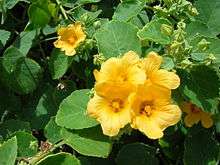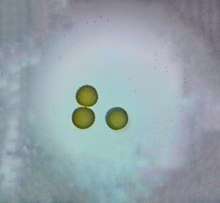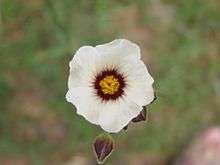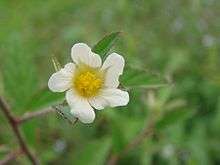Sida (plant)
Sida is a genus of flowering plants in the mallow family, Malvaceae. They are distributed in tropical and subtropical regions worldwide,[2] especially in the Americas.[3] Plants of the genus may be known generally as fanpetals[1] or sidas.[4]
| Sida | |
|---|---|
 | |
| ʻIlima (Sida fallax) | |
| Scientific classification | |
| Kingdom: | Plantae |
| Clade: | Tracheophytes |
| Clade: | Angiosperms |
| Clade: | Eudicots |
| Clade: | Rosids |
| Order: | Malvales |
| Family: | Malvaceae |
| Subfamily: | Malvoideae |
| Tribe: | Malveae |
| Genus: | Sida L.[1] |
| Species | |
|
98-200+, see text | |
| Synonyms | |
|
Pseudomalachra (K.Schum.) Monteiro | |
Description
These are annual or perennial herbs or shrubs growing up to 2m tall (6 feet). Most species have hairy herbage. The leaf blades are usually unlobed with serrated edges, but may be divided into lobes. They are borne on petioles and have stipules. Flowers are solitary or arranged in inflorescences of various forms. Each has five hairy sepals and five petals in shades of yellow, orange, or white. There are many stamens and a style divided into several branches. The fruit is a disc-shaped schizocarp up to 2 cm (3/4 inch) wide which is divided into five to 12 sections, each containing one seed. The pollens are spherical in shape.

Ecology
Many Sida are attractive to butterflies and moths. Arrowleaf sida (Sida rhombifolia), for example, is a larval host for the Tropical Checkered Skipper (Pyrgus oileus).[5]
The Sida golden mosaic virus and Sida golden yellow vein virus have been first isolated from Sida species; the former specifically from Sida santaremensis.
Etymology
The genus name Sida is from the Greek for "pomegranate or water lily".[4] Carl Linnaeus adopted the name from the writings of Theophrastus.[3]
Diversity
Sida has historically been a wastebasket taxon, including many plants that simply did not fit into other genera of the Malvaceae. Species have been continually reclassified.[2] The circumscription of Sida is still unclear, with no real agreement regarding how many species belong there. Over 1000 names have been placed in the genus, and many authorities accept about 150 to 250 valid names today.[2] Some sources accept as few as 98 species.[6] There are many plants recognized as Sida that have not yet been described to science.[7]
.jpg)

- Sida abutifolia Mill. – prostrate sida, spreading fanpetals
- Sida acuta Burm.f. (syn. S. carpinifolia) – common wireweed, broomweed
- Sida aggregata C.Presl – savannah fanpetals
- Sida antillensis – Antilles fanpetals
- Sida calyxhymenia – rock sida, tall sida
- Sida cardiophylla (Benth.) F.Muell.
- Sida ciliaris – bracted fanpetals, fringed fanpetals
- Sida clementii Domin
- Sida cordata – long-stalk sida, heartleaf fanpetals
- Sida cordifolia L. – country-mallow, flannel sida
- Sida echinocarpa F.Muell.
- Sida elliottii – Elliott's fanpetals
- Sida fallax Walp. – ʻilima, yellow ʻilima
- Sida glabra – smooth fanpetals
- Sida glomerata – clustered fanpetals
- Sida hermaphrodita – Virginia fanpetals, river-mallow
- Sida intricata F.Muell. – twiggy sida
- Sida jamaicensis – Jamaican fanpetals
- Sida javensis
- Sida lindheimeri – showy fanpetals
- Sida linifolia – flaxleaf fanpetals, balai grand
- Sida longipes – stockflower fanpetals
- Sida mysorensis Wight & Arnott
- Sida neomexicana – New Mexico fanpetals
- Sida nesogena
- Sida phaeotricha F.Muell. – hill sida
- Sida picklesiana[7]
- Sida pusilla
- Sida repens – Javanese fanpetals
- Sida rhombifolia L. – arrowleaf sida, Cuban jute
- Sida rubromarginata – red-margin fanpetals
- Sida salviifolia – escoba parada
- Sida santaremensis – moth fanpetals
- Sida spenceriana F.Muell.
- Sida spinosa – prickly sida, prickly fanpetals
- Sida tragiifolia – catnip noseburn, earleaf fanpetals
- Sida trichopoda F.Muell. – hairy sida
- Sida troyana
- Sida urens – tropical fanpetals, balai-zortie
Formerly placed here
Species now in other genera include:[8]
|
|
References
| Wikimedia Commons has media related to Sida. |
- Sida. Integrated Taxonomic Information System (ITIS).
- Shaheen, N., et al. (2009). Foliar epidermal anatomy and its systematic implication within the genus Sida L. (Malvaceae). African Journal of Biotechnology 8(20), 5328-36.
- Sida. The Jepson eFlora 2013.
- Sida. FloraBase. Western Australian Herbarium.
- Sida rhombifolia. Lady Bird Johnson Wildflower Center. University of Texas, Austin.
- Sida. The Plant List.
- Markey, A. S., et al. (2011). Sida picklesiana (Malvaceae), a new species from the Murchison-Gascoyne region of Western Australia. Nuytsia 21(3) 127-37.
- GRIN Species Records of Sida. Archived 2015-09-24 at the Wayback Machine Germplasm Resources Information Network (GRIN).
